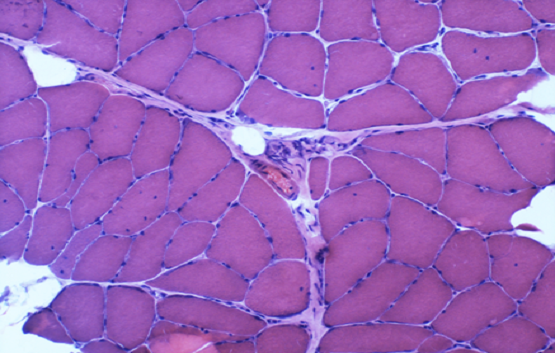EMG Laboratory
The EMG laboratory provides services for the investigation of the peripheral nervous system including neuropathies, radiculopathies, plexopathies, myopathies ...

Multidisciplinary expert care is at the core of the Center’s philosophy, and includes besides the neurology expertise in the complete range of neuromuscular disorders, also pulmonary, cardiac, endocrine, orthopedic and gastrointestinal specialists, along with physiotherapy, speech-swallowing therapy, psychologist, social worker, dietician, and dedicated nursing.
An inpatient ward provides support for up-to date treatments of neuromuscular patients as well as for the conducting of clinical trials.
The Center is supported by the Neuromuscular laboratories, including the Electromyography lab and Neuropathology lab, both of which serve as national referral labs for the specialized services they offer to support the diagnosis of nerve and muscle disease.
The Neuroepidemiology Department provides outpatient clinical services in the fields of neurogenetic diseases, such as Spinocerebellar Ataxias (SCA), Friedreich's Ataxia, Charcot‐Marie‐Tooth Polyneuropathies (CMT), HD, Myotonic Dystrophy and Spinal Muscular Atrophy (SMA). These services also cover a number of neuromuscular disease patients including Myasthenia Gravis (MG), and ALS. A special Botulinum Toxin treatment clinic is offered to a number of patients with focal dystonia’s and spasticity
The Neurogenetics department at CING provides genetic diagnostic services to the Center’s patients, and the Clinical Genetics Center collaborates for the diagnosis and care as well as genetic counselling of inherited neuromuscular conditions. Recently the Neuromuscular Disorders Center was accepted as affiliated Member of the European Reference Network for Neuromuscular Disorders (ERN-Neuromuscular) based in Paris. Leading Neuromuscular Centres throughout Europe participate in this network in order to provide excellence in care, education and research for neuromuscular disorders.
The entire clinical services and related clinical laboratories at CING have been accredited by the CHKS Healthcare Accreditation Standards
The CING offers multidisciplinary care to patients with neuromuscular disorders, including orthopaedic, respiratory, cardiac, gastroenterology, endocrinology (both adult and pediatric) clinical genetic and genetic counselling services. A social worker, a psychologist and a dietician are available on a weekly basis. Speech therapy for swallowing evaluation is also available on a regular basis.
A dedicated inpatient ward provides specialized support for diagnostic and therapeutic approaches in neuromuscular patients as well as a well-organized framework for the conductance of clinical trials at CING.
The Clinical Genetics & Genomics Center is closely collaborating with the Neuromuscular Disorders Center to provide expert diagnostic and genetic counselling services to neuromuscular patients as well as to facilitate multidisciplinary research at CING.
Neurogenetics Department at CING collaborates closely with the Neuromuscular disorders Center, offering a wide range of diagnostic genetic testing for the majority of disorders seen at the Center, as well as next generation sequencing (NGS) platforms for family studies, diagnostic and research applications.
The EMG laboratory provides services for the investigation of the peripheral nervous system including neuropathies, radiculopathies, plexopathies, myopathies and neuromuscular junction defects. Some of the services are Nerve Conduction Studies, Blink Reflex, Jaw Jerk Reflex, Masseter Inhibitory Reflex, Repetitive stimulation, Mixed nerve, Inching technique, Autonomic testing, H‐reflex, Electromyography, Quantitative EMG, Single fibre EMG.
The Neuropathology Lab offers the full range of biopsy diagnostic services for muscle and nerve. A complete set of histological and immunocytological techniques is used to evaluate muscle and nerve biopsies employing a wide spectrum of antibodies against muscle membrane proteins and other cell markers. Frozen and paraffin sections, histochemistry and immunofluorescence labeling as well as semithin and ultrathin electron microscopy evaluation is provided. Morphometric methods are used for the quantitative analysis of both muscle and nerve biopsies.
In the neuropathology lab a wide range of histological and immunocytological techniques are available employing a wide spectrum of antibodies against muscle membrane proteins and other cell markers. Morphometric methods are used for the quantitative analysis of both muscle and nerve biopsies. One third of the muscle biopsies are from Jordan, Syria and Greece. The neuropathology lab has facilities for examination of whole brains, which is particularly important in the diagnosis of dementia.
Neuromuscular Pathology Lab description, infrastructure, people. The Neuromuscular Pathology Lab provides expert services as the referral lab for muscle and nerve biopsy evaluation. It offers the full range of histological and immunocytological techniques employing a wide spectrum of antibodies against muscle membrane proteins and other cell markers. Frozen and paraffin sections, histochemistry and immunofluorescence labeling as well as semithin and ultrathin electron microscopy evaluation is provided. Morphometric methods are used for the quantitative analysis of both muscle and nerve biopsies
The EMG laboratory provides services for the investigation of the peripheral nervous system including neuropathies, radiculopathies, plexopathies, myopathies ...
In the neuropathology lab a wide range of histological and immunocytological techniques are available employing a wide spectrum of antibodies against muscle ...